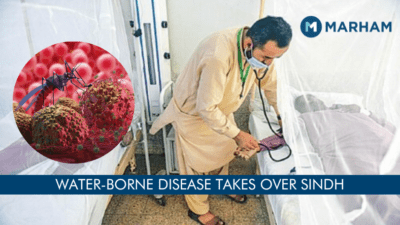Vector-borne diseases claimed three lives on Tuesday, exposing the government’s inability to implement effective preventative measures to limit dengue and malaria outbreaks in Sindh. The province has registered a total of 7,452 dengue cases so far in September.
The two deaths from malaria are the first documented in Sindh from the water-borne infection. A lady died of dengue in Karachi, while two men died of malaria in Sukkur just a few days after being diagnosed. Following the new deaths, a total of 33 people have died this year in Karachi alone as a result of dengue.
In the lack of an efficient preventative plan by the health authorities, health experts anticipated that the situation would worsen with each passing day.
According to Stephane Dujarric, spokesman for UN Secretary-General Antonio Guterres, about 1,500 health institutions have been destroyed by the storm, affecting vaccine cold chains across the nation.
Data from the statistics produced and published by the Sindh health department on Tuesday reports, 254 additional persons tested positive for dengue fever in Karachi in the previous 24 hours.
In the region, 254 people have tested positive for dengue. The accuracy of the official data, however, is critically questioned by independent health specialists who believe the numbers are higher than the official statistics.
A report published on Sept 27 on OCHA describes that:
“More than half (54%) of flood-hit families in Pakistan are sleeping outside in tents or makeshift shelters – often no more than flimsy plastic sheets – while approximately one in six (16%) have no shelter at all, according to new research by Save the Children.”
Dr. Qaiser Sajjad of the Pakistan Medical Association (PMA), says:
“There’s a serious doubt over the authenticity of data being shared by the health department, the feedback we are getting from general physicians these days indicates that at least 15 to 20 patients are daily reporting at one clinic.”
He further adds:
“This suggests that the extent of unreported cases is too large. Secondly, compiling and disseminating the data isn’t enough. We can’t handle this challenge without a prevention strategy. And for that strategy, we need an effective fumigation campaign. Unfortunately, this isn’t happening in Karachi.”
According to the World Health Organization (WHO), vector-borne illnesses account for more than 17% of all infectious diseases and cause more than 700,000 fatalities each year. Parasites, bacteria, or viruses cause vector-borne illnesses.
People are encouraged to see a doctor in the case of suffering from dengue or malaria or any other water-borne disease. Click here to see an online doctor for vector-borne diseases via the Marham app today.

